Dear Child,
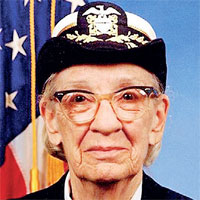 “The most important thing I’ve accomplished, other than building the compiler, is training young people. They come to me, you know, and say, ‘Do you think we can do this?’ I say ‘Try it’ and I back them up” I will tell you a story of mine. My mother, Mary Campbell Van Horne, had been very interested in math as a young woman, but hadn’t been able to study anything beyond geometry because it wasn’t considered proper for a lady at the time. She made sure to encourage me in my interests and not to limit me based me being a girl. My father, Walter Fletcher Murray, wanted all of his children to be self-sufficient and made sure me and my sister had the same education and opportunities as my brother.
“The most important thing I’ve accomplished, other than building the compiler, is training young people. They come to me, you know, and say, ‘Do you think we can do this?’ I say ‘Try it’ and I back them up” I will tell you a story of mine. My mother, Mary Campbell Van Horne, had been very interested in math as a young woman, but hadn’t been able to study anything beyond geometry because it wasn’t considered proper for a lady at the time. She made sure to encourage me in my interests and not to limit me based me being a girl. My father, Walter Fletcher Murray, wanted all of his children to be self-sufficient and made sure me and my sister had the same education and opportunities as my brother.
He strived to make our lives better even though getting an education as a woman was unusual for the early 20th century. I grew up in an academic atmosphere and my parents made sure I had access to all the books I wanted, and they did everything they possibly could to support my curious nature. When I was seven, my mother left me unattended for a little while. I decided that I wanted to figure out how clocks worked, out of boredom and curiosity. To find the answer, I took apart every single alarm clock in the house! (Seven clocks to be exact) When my mother found out, instead of scolding me, she limited me to taking apart only one alarm clock at a time.
It is very important that you surround yourself with people who encourage you to be yourself. For some of us, we’re lucky enough to have supportive and understanding parents and friends. But like you, many struggle in life due to negative criticism and not enough support. I will tell you of an incident where I didn’t take no for an answer. It was in November 1941. Following Japan’s attack on Pearl, I tried to join the military. I was refused, because I was underweight. It was disappointing. It’s plausibly similar to your situation. But, I wanted to try again. In December 1943, my then current job at Vassar College agreed to give me temporary leave.
I then joined the Naval Reserve after applying successfully for a waiver on my weight. I got in. If I gave up after the first attempt and the noise around me, it wouldn’t have been possible. However, on a side note, if you want to join the military and was refused permission for anything, just apply for a waiver – funnily, there were waivers for most things! I trained at the Women’s Midshipman School in Northampton, Massachusetts and at the age of 37 I lived in a room with three much younger recruits. Training was intentionally very demanding; recruits were expected to deal with harsh conditions and pressure situations. But I enjoyed the experience enormously. I went on to achieve the highest training rank – battalion commander – and graduated first in our class in June 1944.
I refused to take ‘no’ for an answer. Listen, life was not always easy for me. In 1949, shortly after becoming Senior Mathematician at J. Presper Eckert and John Mauchly ’s computing company, I was arrested in Philadelphia for drunk and disorderly conduct. After years of pushing myself hard for results, in the late 1940s and early 1950s I ended up pushing myself into depression, alcoholism, and suicide threats. If it’s not an unsupportive family and peer group, there will always be another problem we face. It may not be just one issue, there will be years of grapple before you achieve your dream.
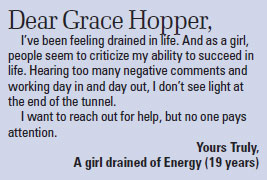
You also need to remember that life will nonetheless have ups and down. After a month of a happy marriage, you may file a divorce. One of your loved ones, may suddenly pass away. Life is much unexpected my dear child. But never back down from a fight which means the world to you. In the end, what you will remain with is the happiness of knowing that you lived the life you wanted to. Never agreeing to anything less than what you deserve or want in life. I will always be there for you. Just read my letter when you feel down.
Love, Grace.
| Grace Hopper (1906-1992) |
|
In an era where women did not pursue careers to realize their potential, Grace Brewster Murray was the First Lady of the Software World. The Great Depression began in 1928, and by 1931 over 8 million Americans were unemployed – the unemployment rate was 16 percent. Grace Hopper was a mathematics assistant at Vassar College during this time. Passionate about mathematics, Hopper submitted a thesis entitled The Irreducibility of Algebraic Equations to Yale and at the age of 27, got her Ph.D. in 1934. America goes to war! After achieved the highest training rank in the Naval Reserve during the WWII – battalion commander and graduating first in her class, Lieutenant Grace Hopper was assigned to Commander Howard Aiken’s Computation Laboratory at Harvard University, in Cambridge, Massachusetts, beginning July 2, 1944. She won the respect of Aiken and the other members of his team, who were working on the Harvard Mark I computer. The 51 feet (15.5 meters) long computer was Aiken’s brainchild and had been built by IBM. It was electromechanical, meaning it was powered by electricity and performed calculations using punch card instructions and moving mechanical parts. It utilized computing principles first worked out by Charles Babbage and Ada Lovelace in the 1800s. Debugged The Mark I could perform in a day calculations that had previously taken a month. It ran 24/7. Its operators, including Hopper, often slept beside the machine, repairing it when things went wrong. Hopper’s first major project was calculating gunnery tables needed by the Navy to aim their new guns accurately, taking account of conditions such as wind speed, weight of shell, and air density. Assembling gunnery tables involved a huge number of calculations – an ideal job for a computer. Hopper learned a lot at Harvard, developing her computer expertize to a level matched by few other people. In September 1947, a moth landed in one of the Mark II computer’s mechanical relays, causing the relay to fail. Someone removed the moth, so the computer was ‘debugged.’ The word already existed in computing, but Hopper and her colleagues thought it was hilarious that they were the first people to literally debug a computer. When the war ended, Vassar College tried to tempt Hopper back, offering her a full professorship. She chose to stay at Harvard with the Naval Reserve, working in the new, intellectually stimulating, rapidly developing field of computing. World’s first A-0 System In 1949, Hopper left the Navy to become Senior Mathematician at an exciting new company in Philadelphia. The company was the brainchild of J. Presper Eckert and John Mauchly who were wartime computer scientists who had built ENIAC, one of the world’s first electronic general-purpose computers. Hopper envisioned of a computer that could program itself. A computer which could take instructions written in a human-friendly language and translate them into machine code. In computing science, such a translator is called a compiler. In 1952, Hopper and her team invented the world’s first compiler, the A-0 system. In April 1959, computer scientists from government and industry got together and defined the needs of a new computing language to be known as COBOL (Common Business-Oriented Language). Grace Hopper was the committee’s technical consultant. In the year 2000 about 240 billion of the 300 billion lines of computer code ever written had been written in COBOL.
Hopper won a very large number of awards – too many to list here! A must mention being, The Legion of Merit in 1973. One award raises a smile: in 1969, the Data Processing Management Association instituted a new award, the Computer Science Man-ofthe- Year award; its first winner was Grace Hopper. In 1991, she received America’s highest technology award, The National Medal of Technology, from President George Bush. In the end Grace Hopper died in her sleep, age 85, of natural causes, on January 1, 1992 in Berkeley, California. In 1997, the Navy named a new guided-missile destroyer in her honor: USS Hopper. |
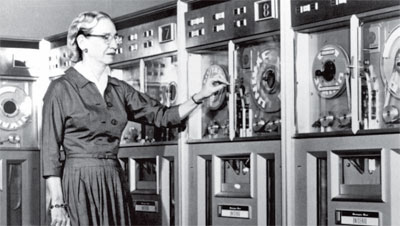
















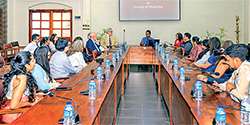
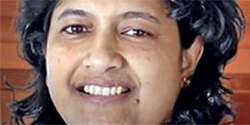


















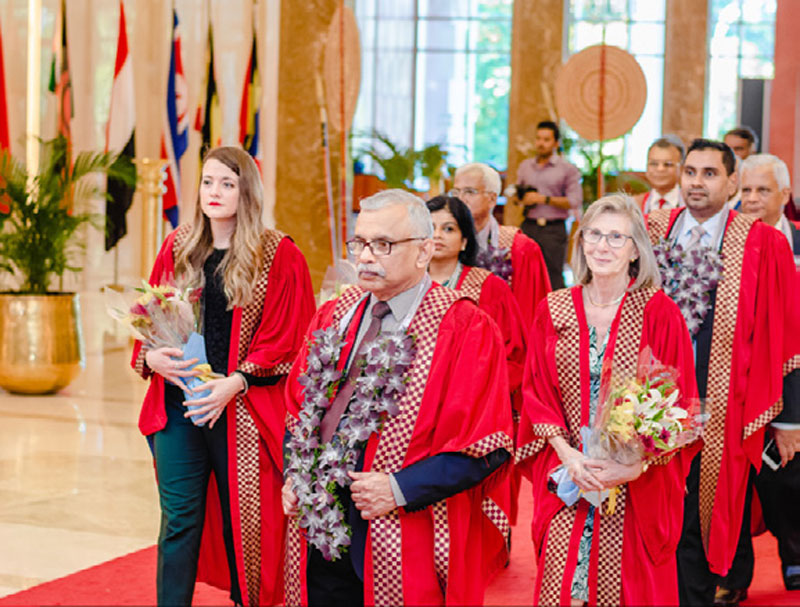


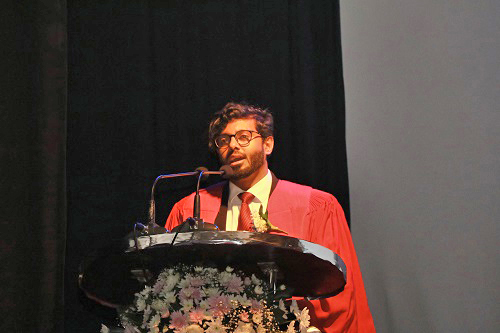
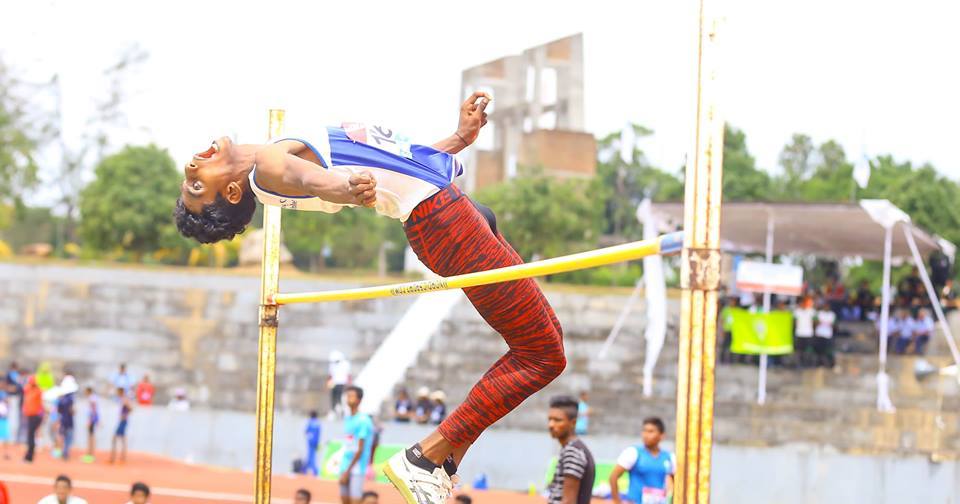
.jpg)
.jpg)
.jpg)
.jpg)
.jpg)
.jpg)
